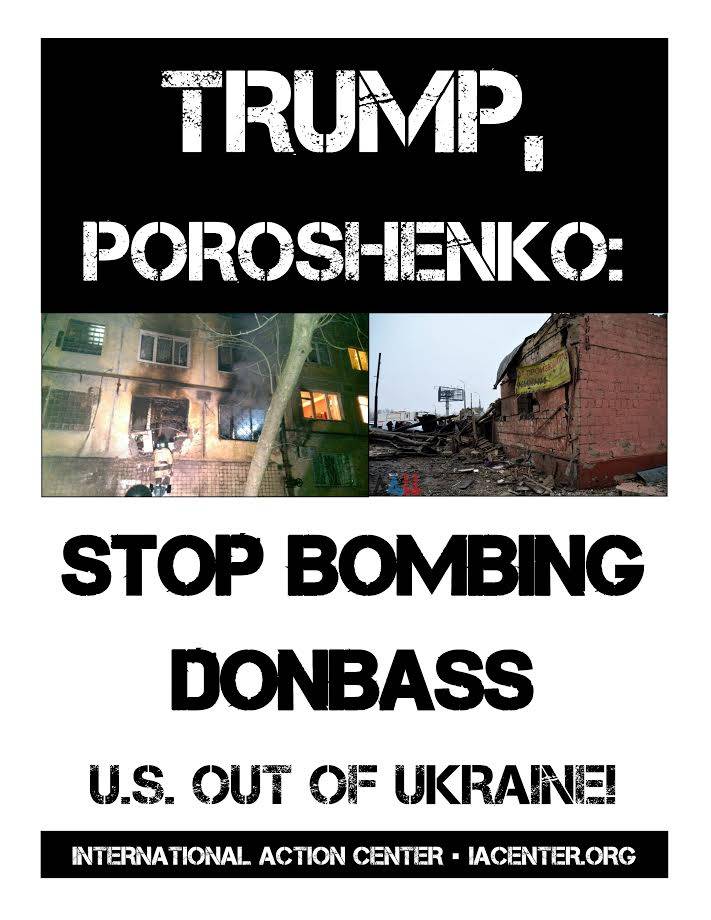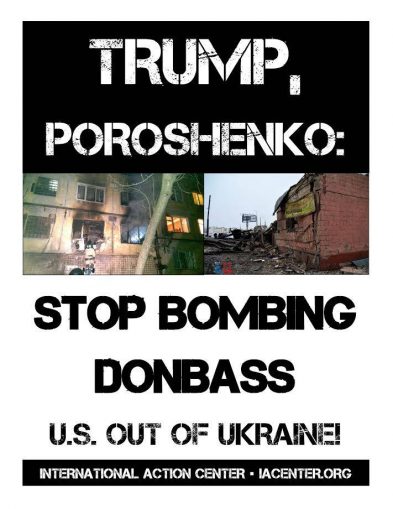



At the same time, contradictory statements and belligerent actions by the Donald Trump administration in Washington have undermined lingering hopes in Donetsk, Lugansk and neighboring Russia for a significant change in the U.S. posture towards Ukraine that could lead to a de-escalation of the war.
In February 2014, a U.S.-backed and U.S.-funded movement called Euromaidan, led by neo-Nazis and right-wing Ukrainian nationalists, toppled the elected government of Ukraine. In its place, this movement installed an open dictatorship of oligarchs, neo-Nazis and politicians oriented to the U.S and the European Union.
This Kiev junta declared war on the primarily Russian-speaking and working-class population of the country’s southeast. This led to uprisings in many cities and the secession of Crimea — which rejoined the Russian Federation by referendum — and Donetsk and Lugansk. People in the Donbass mining region declared independent Donetsk and Lugansk “people’s republics.”
The Obama administration condemned Russia’s reintegration of Crimea, imposing sanctions and using the same pretext to put the NATO military alliance on a provocative war footing in eastern Europe.
Armed and funded by the West, the Kiev regime declared war on Donetsk and Lugansk. Fighting raged for almost a year. Popular anti-fascist militias decisively defeated Ukrainian forces in early 2015. The “Minsk II agreement” was then brokered by Russia, Germany and France. However, the Kiev junta and its U.S. backers have dragged out negotiations while constantly violating the ceasefire agreement.
The United Nations reports that nearly 10,000 people, including more than 100 children, have died as a result of Ukraine’s so-called Anti-Terrorist Operation. The West’s economic blockade has increased the suffering of Donbass residents.
School, homes and hospitals targeted
According to Col. Eduard Basurin, deputy commander of the Donetsk defense forces, Ukraine launched over 15,000 attacks on the republic in the space of a week. This includes attacks by banned heavy weaponry like “GRAD” and “Hurricane” missiles on the capital on the night of Feb. 2. Observers of the Organization for Security and Cooperation in Europe (OSCE) confirmed the attack.
Ukrainian attacks targeted the city’s water treatment facility, as well as residential buildings and a busy highway. Water, electricity and gas were cut off in the dead of winter. Russia’s Foreign Ministry denounced Kiev for violating the Geneva Convention for the Protection of Civilians in Time of War. At least 10 civilians have been killed in the capital.
Basurin reported that 33 towns and villages were hit during the week. Targets included Makeyevka’s elementary school and a local hospital. (DONi News Agency)
Meanwhile, in Lugansk, Ukrainian attacks also escalated in late January, killing civilians and anti-fascist fighters.
Now Ukraine has opened up a new front of attack in the south of Donetsk, with “battles … taking place along the whole southern front.” (DONi News Agency, Feb. 6)
With the buildup of tanks and heavy weaponry by the Ukrainian Armed Forces, Donetsk Deputy Commander Basurin warned that the two republics expect a full-blown military offensive by Kiev.
Trump’s stance: imperialist continuity
What has been the response from Donald Trump, who claimed on the campaign trail that he wanted to improve relations with Russia?
At first, while the killings were mounting, Trump’s administration was silent. Instead of addressing the Ukrainian military aggression, it was crowing over its first military foray in Yemen, where at least 30 civilians, including children, were killed.
Then on Feb. 2, Trump’s ambassador to the United Nations, Nikki Haley, in her first official statement, condemned Russia for “aggressive actions” in Ukraine. This was the very same lie trotted out by the previous U.S. administration. (AFP, Feb. 2)
The following day, news site Politico broke the story that Trump had held a private meeting with far-right Ukrainian politician Yulia Tymoshenko on the sidelines of the Feb. 2 National Prayer Breakfast. According to Tymoshenko and other sources who briefed Politico, Trump promised Tymoshenko that he would not lift sanctions on Russia until it “returns” Crimea and ends support for the Donbass republics. The White House later denied this report.
In a Feb. 4 phone call with Ukraine’s President Poroshenko, Trump mouthed the familiar U.S. line to “cooperate with leaders of Russia, Ukraine and other nations to restore peace in war-torn Donbass.” In a call the same day between Trump and Jens Stoltenberg, the U.S. oligarch reassured the NATO secretary general of his support for NATO and that he would participate in the 2017 NATO summit in Brussels. (Sputnik News, Feb. 6)
The contradictory statements emanating from the White House may reflect internal struggles within the administration regarding relations with Russia. Meanwhile, Trump is launching threat after threat against Iran and China. But the overall picture is one of continuity of U.S. militarism also in Eastern Europe, not the hoped for “breakthrough” to ease the war crisis.
Now more than ever, the heroic people of Donbass need the support of anti-war and anti-fascist forces in the U.S. and around the world. Educating the newly awakened movement that is fighting the attacks of the Trump administration in the spirit of internationalist solidarity will be key.
The centennial of the birth of Malcolm X, also known as El-Hajj Malik El-Shabazz, is…
Philadelphia On Mother’s Day 2025, May 11, Families for Ceasefire Philly and over 20 local…
North Philly Peace Park gathering After a federal court hearing on an anti-immigration bill early…
Supporters of Palestine in Hoboken, New Jersey, were outraged when they found out that the…
Philadelphia Friends, family, fellow union members and community activists gathered at the Octavius Catto statue…
The Trump regime’s decision to lift sanctions on Syria exposes the true purpose of sanctions:…